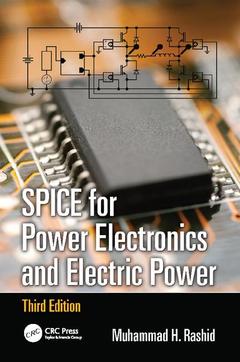SPICE for Power Electronics and Electric Power (3rd Ed.) Power Electronics and Applications Series
Auteur : Rashid Muhammad H.

Power electronics can be a difficult course for students to understand and for professors to teach. Simplifying the process for both, SPICE for Power Electronics and Electric Power, Third Edition illustrates methods of integrating industry standard SPICE software for design verification and as a theoretical laboratory bench.
Helpful PSpice Software and Program Files Available for Download
Based on the author Muhammad H. Rashid?s considerable experience merging design content and SPICE into a power electronics course, this vastly improved and updated edition focuses on helping readers integrate the SPICE simulator with a minimum amount of time and effort. Giving users a better understanding of the operation of a power electronics circuit, the author explores the transient behavior of current and voltage waveforms for each and every circuit element at every stage. The book also includes examples of all types of power converters, as well as circuits with linear and nonlinear inductors.
New in this edition:
- Student learning outcomes (SLOs) listed at the start of each chapter
- Changes to run on OrCAD version 9.2
- Added VPRINT1 and IPRINT1 commands and examples
- Notes that identify important concepts
- Examples illustrating EVALUE, GVALUE, ETABLE, GTABLE, ELAPLACE, GLAPLACE, EFREQ, and GFREQ
- Mathematical relations for expected outcomes, where appropriate
- The Fourier series of the output voltages for rectifiers and inverters
- PSpice simulations of DC link inverters and AC voltage controllers with PWM control
This book demonstrates techniques of executing power conversions and ensuring the quality of the output waveforms rather than the accurate modeling of power semiconductor devices. This approach benefits students, enabling them to compare classroom results obtained with simple switch models of devices. In addition, a new chapter covers multi-level converters.
Assuming no prior knowledge of SPICE or PSpice simulation, the text provides detailed step-by-step instructions on how to draw a schematic of a circuit, execute simulations, and view or plot the output results. It also includes suggestions for laboratory experiments and design problems that can be used for student homework assignments.
Introduction. Circuit Descriptions. Defining Output Variables. Voltage and Current Sources. Passive Elements. Dot Commands. Diode Rectifiers. DC–DC Converters. Pulse-Width–Modulated Inverters. Resonant-Pulse Inverters. Controlled Rectifiers. AC Voltage Controllers. Control Applications. Characteristics of Electrical Motors. Simulation Errors, Convergence Problems, and Other Difficulties.
Muhammad H. Rashid is a professor (and past director, 1997−2007) of electrical and computer engineering at the University of West Florida. Dr. Rashid received his BSc degree in electrical engineering from the Bangladesh University of Engineering and Technology, and his MSc and PhD degrees from the University of Birmingham in the United Kingdom. He has worked around the world as a professor of electrical engineering Dr. Rashid is actively involved in teaching, researching, and lecturing in power electronics. He has published 17 books and more than 140 technical papers. His books are adopted as textbooks all over the world. In addition, He has been invited by many foreign governments and agencies to give keynote lectures and consulted by foreign universities to serve as an external examiner for undergraduate, master’s degree, and PhD examinations, by funding agencies to review research proposals, and by U.S. and foreign universities to evaluate promotion cases for professorship. Among his many awards, Dr. Rashid has received the Outstanding Engineer Award from The Institute of Electrical and Electronics Engineers, the IEEE Educational Activity Award (EAB) for Meritorious Achievement Award in Continuing Education, and the IEEE Undergraduate Teaching Award.
Date de parution : 04-2017
15.6x23.4 cm
Date de parution : 06-2012
Ouvrage de 568 p.
15.6x23.4 cm
Thèmes de SPICE for Power Electronics and Electric Power :
Mots-clés :
PSpice Schematics; Circuit File; Circuit Descriptions; THD; Defining Output Variables; PSpice Plots; Voltage and Current Sources; RLC Circuit; Characteristics of Electrical Motors; Instantaneous Output Voltage; Passive Elements; Output Voltage; Voltage Controlled Voltage Sources; DC DC Converter; Input Power Factor; AC Voltage Controller; DC Sweep; AC Analysis; Subcircuit Definition; DC Input Voltage; DC Supply Voltage; PWM Control; Load Current; Transient Analysis; Single Phase Full Bridge Inverter; OrCAD Capture; Delay Angle; Equivalent Circuit; Freewheeling Diode; AC Supply Voltage



